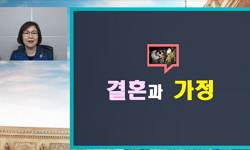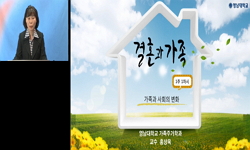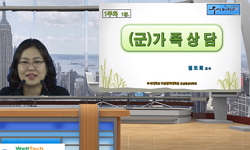Family, which is the standard unit of human society, has maintained its tradition and solidarity around marriage and blood in these changes of human civilization. By the concept from the dictionary, a family is a group of kindred or closely related ...
http://chineseinput.net/에서 pinyin(병음)방식으로 중국어를 변환할 수 있습니다.
변환된 중국어를 복사하여 사용하시면 됩니다.
- 中文 을 입력하시려면 zhongwen을 입력하시고 space를누르시면됩니다.
- 北京 을 입력하시려면 beijing을 입력하시고 space를 누르시면 됩니다.
https://www.riss.kr/link?id=A76441755
- 저자
- 발행기관
- 학술지명
- 권호사항
-
발행연도
2008
-
작성언어
-
-
주제어
가족 ; 혼인 ; 혈연 ; 친족 ; 대안가족 ; 부양 ; 양육 ; 생활공동체 ; 다양한 가족 ; 통합 ; family ; marriage ; relationship by blood ; relative ; alternative family ; support ; bringing up ; living community ; variety of family ; unification
-
KDC
365
-
등재정보
KCI등재
-
자료형태
학술저널
-
수록면
1-28(28쪽)
-
KCI 피인용횟수
5
- 제공처
- 소장기관
-
0
상세조회 -
0
다운로드
부가정보
다국어 초록 (Multilingual Abstract)
Family, which is the standard unit of human society, has maintained its tradition and solidarity around marriage and blood in these changes of human civilization. By the concept from the dictionary, a family is a group of kindred or closely related individuals and adults with responsibilities of care of children. Also, to an individual it is the first experience of a group as the very first regulator; it gives continuous effects to one’s life more than any other things and at the same time it secures the continuation of the society. Therefore, a family is social system of everything made through the family including relations by marriage, parents-children relationship, birth, motherhood, and division of labor by gender and although there are differences in the form and function it still is the one of the most generalized systems. However, as a system of society, there are variety of families which breaches over the extent of traditional definition of family due to the magnification of individualism and the concept of equality following the changes of social structure and social acceptance caused by the following reasons: upward tendency of age of marriage, increasing population of unmarried people, divorce and remarriage, decreasing number of childbirth, and the aging society. Single parent family, remarried family, Same-Sex family, multicultural family, cohabitation and/or ba helor household, teen household, grandparents and grandchildren household and boarding houses are what called as the ‘alternative family’. Generally, the concept of a family presumes the support, raising and living community. From the same context, these people are treated as abnormal families by law and from society even though they are families in reality. These varieties of families are no longer a personal matter caused by individual choice but a social problem. The problem of varying families can not be solved with laws those are established upon the standard of pre-existing families. Which means that traditional and conservative concept of family can not accept the ‘alternative family’ as general family because of the insufficiency of the social recognition and law and institutional inertia. Therefore, to change the recognition of varying families which coexist as members of community, unification of legal and social concepts of family is inevitable. By doing so, we can prepare the ground for legal acceptance of variety of families followed by embodiment of reasonable family policy and also induce the change of social recognition.
목차 (Table of Contents)
- Ⅰ. 서
- Ⅱ. 실정법상의 가족
- Ⅲ. 사회적 관념으로서의 가족
- Ⅳ. 가족에 대한 법적ㆍ사회적 개념의 통합 필요성
- 《참고문헌》
- Ⅰ. 서
- Ⅱ. 실정법상의 가족
- Ⅲ. 사회적 관념으로서의 가족
- Ⅳ. 가족에 대한 법적ㆍ사회적 개념의 통합 필요성
- 《참고문헌》
참고문헌 (Reference)
1 권영성, "헌법학원론(개정판)" 2007
2 장영수, "헌법학Ⅱ(기본권론)" 2003
3 강경근, "헌법(신판)" 2004
4 최갑선, "헌법 제36조 제1항에 의한 혼인과 가족생활의 보장" 14 : 2003
5 허영, "한국헌법론" 2007
6 전광석, "한국헌법론" 2005
7 전경옥, "한국여성정치사회사2" 2004
8 정광현, "한국가족법연구" 1967
9 최홍기, "한국가족 및 친족제도의 이해" 2006
10 배리쏘온, "페미니즘의 시각에서 본 가족" 1991
1 권영성, "헌법학원론(개정판)" 2007
2 장영수, "헌법학Ⅱ(기본권론)" 2003
3 강경근, "헌법(신판)" 2004
4 최갑선, "헌법 제36조 제1항에 의한 혼인과 가족생활의 보장" 14 : 2003
5 허영, "한국헌법론" 2007
6 전광석, "한국헌법론" 2005
7 전경옥, "한국여성정치사회사2" 2004
8 정광현, "한국가족법연구" 1967
9 최홍기, "한국가족 및 친족제도의 이해" 2006
10 배리쏘온, "페미니즘의 시각에서 본 가족" 1991
11 배경숙, "친족,상속법강의" 2006
12 엘리 자레스키, "자본주의와 가족제도" 1983
13 조은, "오늘의 한국가족 어디로 가고 있나" 아산사회복지재단 2006
14 박선영, "여성인권보장 및 차별해소를 위한 관련법 제정비연구―헌법상의 여성관련 조항 개정방안" 2007
15 조미영, "여성과 가족" 2005
16 "김영상, 새로운 가족관계등록제도, 대한변협신문"
17 변화순, "건강가정기본법에 대한 여성주의적 개정안" 2007
18 한국여성학회, "건강가정기본법논란과 여성학의 개입"
19 박민자, "가족의 의미: 가족가치와 규범을 중심으로" 덕성여자대학교 사회과학연구소 10 : 2004
20 이은정, "가족의 범위" 한국가족법학회 20 (20): 2006
21 미셀 바렛, "가족은 반사회적인가" 1994
22 조숙현, "가족에 관한 법률 정의 및 판례의 태도분석" 젠더법학회 2008
23 이재경, "가족법상의 가족개념과 여성학적 대안" 1995
24 법무부, "가족법개정특별위원회 회의록"
25 이경희, "가족법" 2006
26 박민자, "가족과 여성, 새로 쓰는 여성과 한국사회" 1999
27 실비아월비, "가부장제이론" 1996
28 윤진수, "傳統的 家族制度와 憲法― 최근의 憲法裁判所 判例를 중심으로 ―" 법학연구소 47 (47): 149-188, 2006
29 Peter Flora, "The development of Walfare States in Europe and America" 1982
30 한겨레, "3. 13/ 3. 19일자."
동일학술지(권/호) 다른 논문
-
- 한국가족법학회
- 이현재(Hyun Jai Lee)
- 2008
- KCI등재
-
- 한국가족법학회
- 김유미(You Mee Kim)
- 2008
- KCI등재
-
- 한국가족법학회
- 현소혜(Hyun So Hye)
- 2008
- KCI등재
-
- 한국가족법학회
- 李鍾吉(Jong-Khil Lee)
- 2008
- KCI등재
분석정보
인용정보 인용지수 설명보기
학술지 이력
| 연월일 | 이력구분 | 이력상세 | 등재구분 |
|---|---|---|---|
| 2026 | 평가예정 | 재인증평가 신청대상 (재인증) | |
| 2020-01-01 | 평가 | 등재학술지 유지 (재인증) |  |
| 2017-01-01 | 평가 | 등재학술지 유지 (계속평가) |  |
| 2013-01-01 | 평가 | 등재학술지 유지 (등재유지) |  |
| 2010-01-01 | 평가 | 등재 1차 FAIL (등재유지) |  |
| 2008-01-01 | 평가 | 등재학술지 유지 (등재유지) |  |
| 2005-06-13 | 학술지명변경 | 외국어명 : Korean Journal of Korean Law -> Korean Journal of Family Law |  |
| 2005-06-10 | 학술지명변경 | 외국어명 : Korean Journal of Korean Law -> Korean Journal of Family Law |  |
| 2005-01-01 | 평가 | 등재학술지 선정 (등재후보2차) |  |
| 2004-01-01 | 평가 | 등재후보 1차 PASS (등재후보1차) |  |
| 2003-01-01 | 평가 | 등재후보학술지 선정 (신규평가) |  |
학술지 인용정보
| 기준연도 | WOS-KCI 통합IF(2년) | KCIF(2년) | KCIF(3년) |
|---|---|---|---|
| 2016 | 0.87 | 0.87 | 0.83 |
| KCIF(4년) | KCIF(5년) | 중심성지수(3년) | 즉시성지수 |
| 0.77 | 0.77 | 0.758 | 0.5 |





 KCI
KCI 스콜라
스콜라







